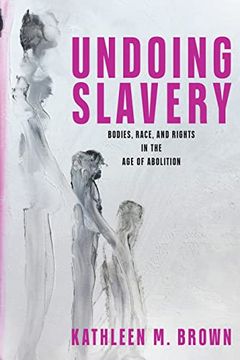Compartir
Undoing Slavery: Bodies, Race, and Rights in the age of Abolition (Early American Studies) (en Inglés)
Kathleen M. Brown
(Autor)
·
University of Pennsylvania Press
· Tapa Dura
Undoing Slavery: Bodies, Race, and Rights in the age of Abolition (Early American Studies) (en Inglés) - Brown, Kathleen M.
$ 49.150
$ 81.910
Ahorras: $ 32.760
Elige la lista en la que quieres agregar tu producto o crea una nueva lista
✓ Producto agregado correctamente a la lista de deseos.
Ir a Mis Listas
Origen: Estados Unidos
(Costos de importación incluídos en el precio)
Se enviará desde nuestra bodega entre el
Jueves 06 de Junio y el
Jueves 13 de Junio.
Lo recibirás en cualquier lugar de Chile entre 1 y 3 días hábiles luego del envío.
Reseña del libro "Undoing Slavery: Bodies, Race, and Rights in the age of Abolition (Early American Studies) (en Inglés)"
Undoing Slavery excavates cultural, political, medical, and legal history to understand the abolitionist focus on the body on its own terms. Motivated by their conviction that the physical form of the human body was universal and faced with the growing racism of eighteenth- and nineteenth-century science, abolitionists in North America and Britain focused on undoing slavery's harm to the bodies of the enslaved. Their pragmatic focus on restoring the bodily integrity and wellbeing of enslaved people threw up many unexpected challenges. This book explores those challenges. Slavery exploited the bodies of men and women differently: enslaved women needed to be acknowledged as mothers rather than as reproducers of slave property, and enslaved men needed to claim full adult personhood without triggering white fears about their access to male privilege. Slavery's undoing became more fraught by the 1850s, moreover, as federal Fugitive Slave Law and racist medicine converged. The reach of the federal government across the borders of free states and theories about innate racial difference collapsed the distinctions between enslaved and emancipated people of African descent, making militant action necessary. Escaping to so-called "free" jurisdictions, refugees from slavery demonstrated that a person could leave the life of slavery behind. But leaving behind the enslaved body, the fleshy archive of trauma and injury, proved impossible. Bodies damaged by slavery needed urgent physical care as well as access to medical knowledge untainted by racist science. As the campaign to end slavery revealed, legal rights alone, while necessary, were not sufficient either to protect or heal the bodies of African-descended people from the consequences of slavery and racism.

